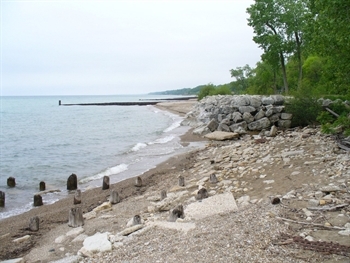
Jason Mrachina
Oak Street and North Avenue Beaches on the Lake Michigan coast
Abby Crisostomo is a research assistant at MPC.
Public-private partnerships, interjurisdictional collaboration, planning for water in the face of climate change. No, this isn’t just a list of projects MPC is working on. These were also some of the major themes discussed at the Coastal Zone 2011 Conference that I attended last week here in Chicago.
The Chicago region is in the midst of a unique time in its coastal management history. Illinois is the last state, territory or commonwealth of the 35 eligible to participate in the National Coastal Zone Management Program through the National Oceanic and Atmospheric Administration (NOAA). Though it has managed its coast through other means over the years, Illinois’ Coastal Management Program (ICMP), which is expected to go into effect around October, will allow local coastal projects access to NOAA funding. Todd Main, senior policy advisor at the Illinois Dept. of Natural Resources and program manager for the ICMP, helped coordinate the conference and expressed excitement at the opportunities that will open up for Chicagoland communities to improve economic and environmental protections and improve connections to the Lake. For example, ICMP funding may go toward projects that create better beach access, prevent and monitor erosion, provide outreach and education, promote preservation and restoration, collect data, control nonpoint source pollution, enable government coordination and more.
The conference was the 17th international symposium on ocean, coastal and Great Lakes issues held biennially since 1978. Overlooking the shores of Lake Michigan, the conference brought 1,053 attendees to the Hyatt Regency for five days of learning, problem-solving, networking and generally appreciating our aquatic areas. The general mood at the conference was hopeful and proactive even despite the threat of funding cuts from all levels of government and the intense weather from Chicago’s latest heat wave astounding visitors and providing a visceral reminder of the effects of climate change.
Perhaps because of the threats to coastal management budgets, the theme of collaboration was repeated throughout. The collaborations discussed included interagency coordination between government departments, regional coordination between municipal governments, coalitions of research institutions, and public-private partnerships. The Corporate Wetlands Restoration Partnership (CWRP) and Coastal America are two public-private partnerships that use corporate money to help local governments improve aquatic habitats. President Obama’s recently established National Ocean and Great Lakes Policy strengthens coastal stewardship across the country through interagency coordination and coastal and marine spatial planning using integrated research.
Much like our What Our Water’s Worth campaign, providing access to information, communicating with the public and encouraging participation about water issues were another big set of themes at the conference. The Great Lakes Observing System is a portal for real-time observational data from around the Great Lakes that researchers and the general public can access (some have been known to check the site to see if the waves are good enough to leave work early to go surfing or boating). Others talked about getting communities involved in protecting and restoring their waterfronts through smart growth, hands-on restoration projects, promoting water reuse, online mapping and data tools and more.

Michael Iversen
Finally, many of the conference sessions focused on the intersection of local economic development, climate change adaptation, disaster and hazard mitigation, and protecting coastal environments. Economic revitalization in Great Lakes communities and in the Gulf Coast is a critical issue, particularly in response to extreme weather patterns, like rising temperatures and hurricanes, and man-made disasters, such as the Deepwater Horizon oil spill and infrastructure disinvestment. While the national discussion about climate change is mired in politics, communities are moving forward to adapt to its effects. The closing plenary, “Innovation and Adaption to a Changing Climate Change,” brought together climate experts who reported that coastal states are leading the nation on climate change adaptation plans and innovative strategies to deal with sea level rise and stormwater management. People care about protecting what they love in their communities and experts need to engage with them on that personal level, leaving climate change adaption to naturally weave into those discussions.
Attending the conference allowed me to meet people from all over who are doing innovative work to create competitive and sustainable communities, much like we’re doing at MPC. Creating and maintaining personal connections to our water resources is important for ensuring continued use and enjoyment of the Great Lakes and other coastal areas. Collaboration, between experts and citizens, public and private sectors, academics and policymakers, is essential to getting the job done.